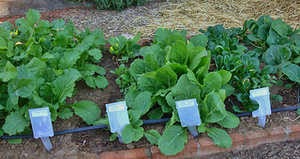Hello, my name is Sophie Walton and I confess to murder...murder of my spring garden.
Sometime after turning 45, I decided that I was Ouiser (aka "Weezer") from Steel Magnolias. I should wear overalls and a floppy hat while growing tomatoes. There was one problem with this scenario: I had no idea how to grow a spring garden. My idea of gardening was browsing through the Whole Foods next to my office, but I was determined that I would learn how to garden in spite of my husband's irritating laughter every time I mentioned the words "spring garden."
I wish that I could say I am an expert gardener but I cannot. However, I have managed to learn enough spring gardening tips to keep my plants alive for a full season.
Five spring gardening tips from the trenches
Sometime after turning 45, I decided that I was Ouiser (aka "Weezer") from Steel Magnolias. I should wear overalls and a floppy hat while growing tomatoes. There was one problem with this scenario: I had no idea how to grow a spring garden. My idea of gardening was browsing through the Whole Foods next to my office, but I was determined that I would learn how to garden in spite of my husband's irritating laughter every time I mentioned the words "spring garden."
I wish that I could say I am an expert gardener but I cannot. However, I have managed to learn enough spring gardening tips to keep my plants alive for a full season.
Five spring gardening tips from the trenches
- Dirt is important. Who knew that dirt came in different types? I was very proud of my first spring garden. The rows were so neatly planted, I remembered to water my plants each day and plucked each weed that dared to raise its ugly head in my garden. Then all of my plants died! Good garden soil must include a mixture of fertilizers, including organic animal manures and nitrogen for young plants to grow and thrive. You should also look for soil that allows for good drainage. A great garden begins with good soil.
- Timing is everything. One reason my first garden failed is I went to the home improvement store, chose the prettiest tomato plants they had, brought them home and plunked them into my garden. I did not understand why those pretty, lush, healthy plants died within a few weeks. It was because they were greenhouse plants and bringing them home and thrusting them into the reality of my garden was too much for them to handle, so they did the only thing they could -- withered and died. I learned that it was too early in the season to plant tomatoes in my area. Once I learned more about the seasons of planting (you can check your USDA plant hardiness map here), my spring garden began to flourish and produce edible vegetables and fruit.
- Vegetables do have friends. Who knew that there was more to the children's cartoon "Veggie Tales" than a biblical lesson. There is also a great tip for spring gardeners: Some vegetables prefer to grow beside other vegetables. For example, my tomatoes did much better when I grew them with basil and my corn, and green beans do much better when they are side-by-side. Some plants thrive off other plants when they are paired together in a spring garden. Before planting, refer to this chart to find the vegetables that are friendly with each other and those that are bad companions in the garden.
- Weeds are bad. I hate weeding because it is tedious and boring. However, I quickly learned that if I do not stay on top of weeding, it quickly becomes a huge gardening problem. I pluck weeds each time I water my garden, and I also learned how to control weeds naturally with mulch. Weed control is important to keep your garden healthy.
- A protected garden is a successful garden. I am a firm believer that part of the reason we experience more illnesses now than ever before is because of what we put into our body, the ground, and the air around us. Therefore, I hated the thought of using any type of chemical pesticides in my garden. Unfortunately, without some type of garden pest control, my tender vegetable plants were a feast for insects and other garden parasites. I found that using organic pesticides and learning about organic pest control helped stop weeds and other insects from reaping what I had sowed.



















